April 2021
Maureen Tolman Flannery has grounded her poetics in the various landscapes of her life experience: Wyoming, where she grew up in a sheep-ranching family and
has recently returned to rescue and restore two historic log cabins, Mexico, where she became infatuated with the rich complexity of its culture; and Chicago,
where she and her husband of 52 years settled to raise their family of three sons and a daughter.
When did you begin writing poetry?
As a child I composed rhymes in my head and played with phrases. I was introspectiveand found comfort in aptly worded comparisons. But I actually tried writing what I thought to be poems in high school. Looking back, I realize they were trite and mostly doggerel. But even as an adolescent I looked to serious poetry to address my wonderment. I had an excellent teacher, Mr. Fassler, who became a close friend and mentor. I felt that he related to a side of me that no other adults understood. Perhaps he sensed the poet in me trying to emerge. As a young adult I continued writing consistently and felt relieved to find words for my bewilderment.
What triggered your interest in creating poems?
I think that teacher, Mr. Fassler, while he did not actually trigger my interest, fostered and enhanced it by sharing his love of literature and making me a comrade in word-appreciation. When I encountered Wordsworth’s “Ode on Intimations of Immortality” I realized that my spiritual search and language were allied and would be forever complementing each other.
Who are your favorite poets?
I connected to the Romantics, Wordsworth and Coleridge, in high school, but did not begin reading modern poets until college. When I found Dylan Thomas I was totally smitten. I still maintain that “Fern Hill” is the greatest poem in the English language. Hopkins marvelously bent language to his own purposes. Oddly enough, many of my most revered poets are men. I admire Frost as one who can consistently manage end-rhyme without its sinking into bad verse, something I am unable to do. I tend to attach myself to particular poems rather than poets. Often it is only one poem that makes a writer great in my eyes. “Death of the Ball Turret Gunner” for example. I have read whole volumes by Robinson Jeffers and nothing else ever made an impression on me like that one short perfect poem. So, too, Wilfred Owen’s “Dulce et Decorum Est” is embedded in my psyche.
I love the work of Anne Riddler and Sharon Olds for her family-inspired poems.
What inspires you? Other poets, painting? music?
I am most often inspired by a question, something strange, off-kilter, incongruent or otherwise baffling. Sometimes a perplexing encounter finds expression in magical realism. Many poems are triggered by observation of simple, everyday things. Nature is also a faithful muse.
Where have you published?
I was almost fifty when I first began to send out poetry, so I attacked the process with a vengeance when I finally lent myself to it. By that time I had a huge body of work—stuffed into a drawer, not even all entered into computer. So I always had the maximum number of poems available for any call for submissions or anthology topic. I have published poems in 50 anthologies and over 200 literary journals. Some of my favorite publications are: Atlanta Review, Amherst Review, Birmingham Poetry Review, Blue Mesa Review, BorderSenses, Calyx, Comstock Review, Evansville Review, Full Circle Journal, Green Hills Literary Lantern, Kamaru, Margin, Meridian, Midamerica Poetry Review, Natural Bridge Magazine, NYBig City Lit, Out of Line, Owen Wister Review, Poetry East, Pinon Poetry, Pudding, Rainbow Curve, Riverwind, Rockhurst Review, Santa Fe Literary Review, Slipstream, Square Lake, St. Anne’s Review
Are you in a feedback group that meets regularly? If so, How often?
I have been a long-time participant of Poets’ Club of Chicago, the oldest critique group in Chicago, having begun in 1936. It was home to such fine deceased poets as John Dickson and Gertrude Rubin. I also participate in a small workshop with three other women poets. It has been very useful as a support and critique group, especially when I am working on a series of poems for a particular book.
We know every poem is different but--on average--how many revisions does one of your published poems require?
Some of my best poems have come out fully formed and required only minor edits. Others have gone through as many as five or six incarnations. I found that the process of submitting for possible publication was the best way to continue to revise and improve a poem. Each time I re-submitted a rejected poem I always found something to change or fix. Even though a poem may be old and published multiple times, I continue to tweak and (hopefully) improve it each time I take another
look at it.
The poem featured here, for example, I wrote “Litany for a Rancher” one evening on my way home from work. I pulled into a parking lot and scribbled it onto a scrap of paper while thinking about my uncle who was dying. The version you see here was labeled #5, so I must have changed line breaks and various words here and there, but it is basically the same poem that emerged that night.
Do you gear some of your work toward performance poetry rather than the written form? Why or why not?
A few of my poems lend themselves more to performance, perhaps those with humor or more fast-action word-play. I always love reading my poems. I believe it is the way poems should be experienced—as read by the author. But I don't actually write for performance. I have only a few committed to memory. I greatly admire performance poets and that art form requiring them to be doubly talented.
How long might you struggle with a poem that doesn’t seem to want to come together?
I have often revisited an experience many years after the fact and written a poem re-focusing on the phenomenon. While I don't usually have to struggle with a poem to get it down, I am always eager to revise later. I recall one poem I wrote about a horrific story I had heard on the news thirty years before. So perhaps the poem was germinating a long time before I began to write it.
Is there a special person in your life you’re inclined to share your work with? Explain.
My husband Dan is always a willing listener. And, because he is an instinctive
good speller and an English teacher as well, he has been willing to copy-edit all my books. My daughter is an excellent poet herself, so I often share a piece with her soon after it's written. I bring rough new poems to Poets' Club and inevitably
find just the help I need.



